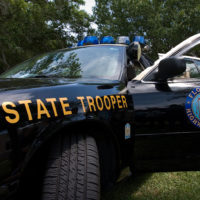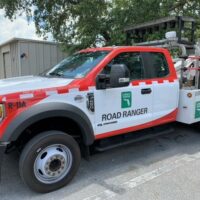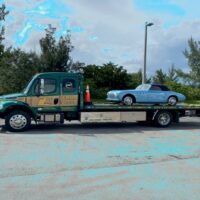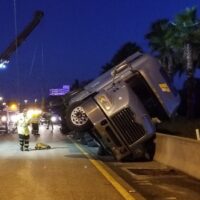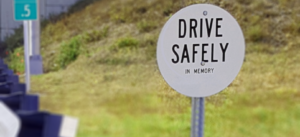Safety and Assistance
MAXIMIZING DRIVER SAFETY
The Move Over Act was instituted in the State of Florida in July 2002 to protect law enforcement officers and other emergency workers stopped alongside our highways. Drivers are required to approach cautiously when an emergency vehicle is stopped ahead with its lights flashing. Drivers must change lanes away from the emergency vehicle if they are on a multi-lane highway and can do so safely. If drivers cannot change lanes safely, or if they are on a two-lane highway, they must slow down to a speed that is 20 miles per hour below the posted speed limit. A Move Over violation can result in fines, fees, and points on your driving record being assessed.
To learn more about the Move Over Act, please visit the website for the Florida Department of Highway Safety and Motor Vehicles.
The Wireless Communications While Driving Law took effect on July 1, 2019. The law allows law enforcement to stop motor vehicles and issue citations to drivers that are texting and driving. A person may not operate a motor vehicle while manually typing or entering multiple letters, numbers or symbols into a wireless communications device to text, email and instant message.
The law also states that a person may not operate a motor vehicle while using a wireless communications device in a handheld manner in a designated school crossing, school zone or active work zone area. Active work zone, as it pertains to this law, means that construction personnel are present or are operating equipment on the road or immediately adjacent to the work zone area.
To learn more about distracted driving, please visit the website for the Florida Department of Highway Safety and Motor Vehicles.
Florida law requires that drivers remain in the right-hand lanes and only use the far left lane for passing. Failure to move from the far left lane to allow faster vehicles to pass is considered a moving violation. Please remember to use your turning signals to indicate your intention to turn or change lanes.
To learn more about The RIGHT Lane, please visit the website for the Florida Department of Highway Safety and Motor Vehicles.
All drivers should use extra caution when driving around motorcyclists and commercial motor vehicles, such as large trucks and buses. All these modes of transportation have the same privileges, rights and responsibilities on public roadways. It is important to share the road so that all users can Arrive Alive!
To learn more about sharing the road, please visit the website for the Florida Department of Highway Safety and Motor Vehicles.
Driving under the influence (DUI) inhibits your ability to drive safely. Alcoholic beverages, controlled substances, prescriptions, or over-the-counter medications can cause impairment. Driving impaired puts you and everyone else on the road in danger.
The Florida Highway Patrol and law enforcement officers statewide are trained to spot the signs of impaired driving. Surveillance on Turnpike roadways can be performed by ground or by air to enhance the safety of Florida’s residents and visitors.
To learn more about impaired driving, please visit the website for the Florida Department of Highway Safety and Motor Vehicles.
Florida’s Turnpike Enterprise wishes to remind drivers that roadway shoulders are for emergency use only. Driving on the shoulders to avoid congestion is strictly prohibited. You should only stop on shoulders if you are experiencing car trouble and have dialed *FHP for assistance. During times of emergency evacuation, shoulders may be used as an additional travel lane, but those times will be clearly communicated and signage will indicate limitations.
Wrong way driving occurs when a vehicle has not observed posted traffic signs or pavement markings and proceeds in a lane going the wrong direction. While wrong way driving crashes occur less frequently than other types of crashes, they often can result in fatalities and/or serious injuries.
Florida’s Turnpike has implemented countermeasures to correct wrong way entry via LED-highlighted wrong-way signage. These enhanced signs are part of a Wrong-Way Driving Alert System designed to:
- Detect when vehicles are traveling in the wrong direction.
- Activate the lights on the sign to notify the driver.
- Send an immediate alert to officials.
- Broadcast an alert on electronic message boards to alert upstream drivers.
If a driver encounters a wrong-way driver or sees an alert displayed on an electronic message board, they should use caution, reduce speed, pull over if safe to do so, and report any wrong-way sightings by calling 911.
A work zone involves workers, vehicles, trucks, and equipment that can necessitate lane closures, detours, and moving equipment, and can last from a few days to several years. The safe and efficient flow of traffic through work zones is an ongoing priority for Florida’s transportation and traffic safety partners.
To help keep work zones safe:
- Move early into open lanes during work zone traffic shifts.
- Drive slowly, stay alert and avoid all distractions.
- Give workers extra room and slow down as you approach a work zone.
- Be prepared to stop.
- Plan ahead by researching your route to prepare for work zones.
To learn more about work zone safety, please visit the website for the National Work Zone Safety Information Clearinghouse.
Please be advised that U-Turns on Florida’s Turnpike System are only permitted at service plazas, located approximately every 40 miles. Drivers who attempt to make U-Turns at emergency vehicle turnarounds could be subject to traffic citations.
Speeding is against the law and is extremely dangerous. Speeding reduces your ability to detect danger and react safely. Speeding also significantly reduces gas mileage, and fines can cost you more than $150. Most importantly, speeding kills an average of 300 people each year in Florida. No matter how eager you are to get to your destination, speeding and driving aggressively is dangerous.
It is important to note that the legal speed limit on highways in Florida can vary depending on the location, but it will not be higher than 70 miles per hour. Surveillance on Turnpike roadways can be performed by ground or by air to enhance the safety of Florida’s residents and visitors.
To learn more about how speed limits are established, please visit the website for the Florida Department of Transportation.
Incident Management
If you are involved in a crash, or experience vehicle problems on any roadway within the Florida’s Turnpike System, call *347 (*FHP) for assistance 24 hours a day, 7 days a week. Select an image below for individual program details.
During your travels, if you see incident responders from any of the above agencies working at a scene with lights activated,
please slow down, and move over a lane to give them safe room to work.
Park & Ride Lots
The Park & Ride lots along Florida’s Turnpike System are great places to meet your carpool or vanpool group to share the ride to work. Parking is available for free on a first-come, first-served basis, but customers cannot leave their vehicles overnight. Please use the spaces specifically marked for Park & Ride use in these lots.
- Stuart / SW Martin Downs Boulevard – Milepost 133 (Martin County)
- Indiantown Road – Milepost 116 (Palm Beach County)
- Palm Beach Gardens Boulevard – Milepost 109 (Palm Beach County)
- Lake Worth Road – Milepost 93 (Palm Beach County)
- Golden Glades – Milepost 0X (Miami-Dade County)
- Coral Reef / 152nd Street – Milepost 16 (Miami-Dade County)
For additional Park & Ride lots in South Florida please call


